This is hardly the first time I’ve said this, nor is it likely to be the last, but the trailer for this spoils a major element of the film, essentially telling us what’s going to happen to a central character, which is a real shame although the film nevertheless manages to be both intriguing and thought provoking. Ian (Michael Pitt) and Karen (Brit Marling) are two young scientists investigating the biological evolution of the eye, when Pitt falls in love with the artistic and free spirited Sofi (Astrid Bergès-Frisbey) who sparks not only romance but also provides the kindling that sheds a light on a more spiritual outlook on life than the somewhat cold rigour Ian is used to. Ultimately, this leads them to examine in detail the old adage of the eye being the window to the soul as they question whether the seemingly random colour pattern of our irises may have a deeper significance.
This has a lot in common with the likes of ‘Transcendence‘ and ‘Lucy‘ where we have a somewhat far fetched story, but one that has enough tangents with real possibles that it remains interesting and presents questions that the audience can go off and try to research answers to if they feel so inclined – here though the focus is on the story and characters, rather than special effects as in the other two films. It’s the old clash of science and philosophy and it’s always fascinating to consider how much one has influenced and penetrated the other and yet the amount we ‘know’ in a scientific sense is always dwarfed by that which we have no answers to, the quintessential questions of life and death. The classic example of debunking astrology as nonsense, and yet science tells us the atoms in our bodies were once burning away at the hearts of stars somewhere in the universe and so that idea of some kind of cosmic interconnectivity is not as nonsensical as it first seems (I’m not saying I believe in astrology I should point out, although the Chinese have a better system than the Zodiac anyway, as they have a DRAGON in it).
The film is written and directed by Mike Cahill, who worked with Marling before on ‘Another Earth’ (11) and as with that film there are shades of pretension that it could have done without. Such as Karen dramatically writing screeds of information on the window panes instead of just using paper like a normal person, and Ian smoking throughout many scenes in the first half of the movie – since smoking makes thousands of people every year go blind it seems very unlikely a studious eye researcher and biologist would take it up in this day and age. Pretentious. They also go on a trip to India, but really this is to drive the story forward rather than being justified by the statistics they use – they could easily have sought the proof they were after closer to home. Some more ropey science together with these errors doesn’t detract too much from the story overall so long as you find the central hook conceptually interesting to begin with.

